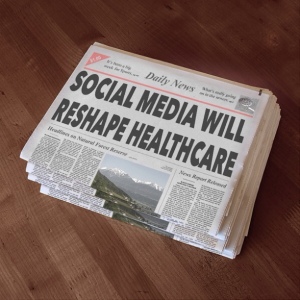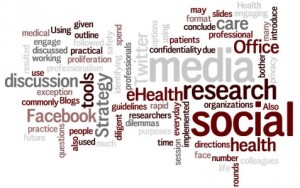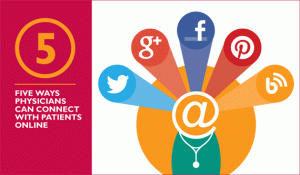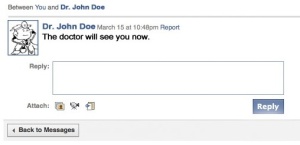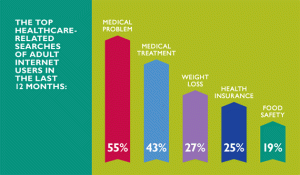Introduction
Since the cultivation and rise of the internet, complemented with the introduction of new media, medical practitioners have been provided with a new world of opportunities to help current and potential patients learn about the identification of symptoms, diagnoses and treatment without having to physically visit a hospital or clinic for consultation. If we look back no more than 20 years ago, who could have imagined that in today’s age hospitals, specialized medical practices and drug manufacturers can now liaise and interact with the public through various social media platforms such as Facebook? Some practices have even set up their own social media platforms in the form of virtual online clinics, where users (patients) can have full access to the medical expertise of real practitioners and medical specialists. How is all of this possible? How has this revolutionized medical diagnoses and treatment? This paper intends to answer these questions, then investigate and illustrate the benefits, risks and implications of online health services via social media focusing on the diabetic community. Recommendations for future users of online medical content will also be included.
First, this paper will explore the concept of social media before progressing further into the analysis. According to Ahlqvist, Black, Halonen and Heinonen, social media is the interaction among people in which they create, share or exchange information and ideas in virtual communities and networks (2008). Essentially, social media relies on the development of interactive platforms by mobile and various other web-based organisations in order for users to distribute, discuss and edit user-generated content in a collaborative manner. They introduce substantial and pervasive changes to communication between organizations, communities and individuals. (Kietzmann and Hermkens, 2011) Social media can be categorized in many different forms such as weblogs, podcasts, internet chat forums, social networks, wikis and so on. This paper will focus primarily on online discussion boards, and social media platforms like Facebook for health advice, medical diagnoses and treatment. Health coaching implemented through mobile phone applications will also be covered.
The rise of the online healthcare community
The advent of the internet has proved to be beneficial for many reasons, and has become a very convenient source of information in regards to health and medicine. Over time, the amount of health consumers accessing online health information is increasing as medical help is becoming more readily available, easier to understand and easier to interpret.
Wikgren (2001) looks at the daily management of a chronic illness such as diabetes and to what extent the internet has changed the way in which people communicate about symptoms and illnesses. Nowadays, many patients acquire second and third opinions from multiple online health websites and resources, more specifically, information and diagnoses “that used to be only in the hands of the professionals” (p. 305) The study investigates how diabetics who actively contribute to discussion groups locate and evaluate medical information relating to the treatment and management of their illness. The results showed that “discussion groups on the internet constitute a hybrid channel, neither formal nor informal/interpersonal, but with attributes usually associated with both”. (p. 407) It also found that seeking and gathering information becomes an autonomous practice in a diabetic’s life, particularly reflected in the “discussions about the use or nonuse of dietary supplementation”. (p. 407) Similarly, Huh and Ackerman (2010) talk about the way in which online health communities are becoming more emotional and more interactive among peers. The qualitative study explores face-to-face support groups of diabetes patients and their relevant online communities and stresses that a major challenge “in supporting diabetes through online communities is that each patient is unique in terms of knowing what is safe, what works and what does not work in managing her or her diabetes”. (p. 1) In addition to this, it is essential to know that a disease like diabetes is progressive, meaningithas the ability to change over a period of time. With this in mind, it is imperative that patients and healthcare providers remain vigilant in monitoring changes, where healthcare providers must constantly update their online services in order to maintain and uphold the correct treatment and management plan of that time. Greene, Choudry, Kilabuk and Shank (2010) examine the use of pages dedicated to diabetes on Facebook and how these pages act as sources of new information and support and how they have become vital to diabetic patients in keeping up to date with new knowledge and advice in relation to the illness. The study found that patients and their friends and families use Facebook to share important medical information, to seek support, empathy and gain new information from other patients and healthcare providers who frequent those pages. “Facebook provides a forum for reporting personal experiences, asking questions, and receiving direct feedback for people living with diabetes”. (p. 287) Armstrong and Powell’s study also support that patients living with long-term illnesses feel much better when they can liaise with patients with the same condition as them, with online health forums, social media pages and discussion boards being a “cost-effective and interactive way of achieving this”. (p. 313) One negative aspect is that there are no guarantees about the authenticity of some posts. This concept will be discussed further in this paper.
According to a study by private health insurance company, Simplyhealth (2011), nearly 50% of people admit that the way they access and pursue information and guidance about a health issue has changed in the last 10 years, where 58% say they prefer checking the internet about symptoms and possible diagnoses before seeing a healthcare provider. These figures demonstrate how important the internet is in terms of accessing medical information, and ultimately suggests that the way in which people access medical information and interact with healthcare providers has evolved and shifted over the years and will continue to do so in the future. Furthermore on the topic of the evolution of online healthcare, a study by Jenkins and Ma’ayan (2013) agrees that online healthcare is rapidly moving towards a bigger, newer future where “besides being an organ donor, patients will be asked to be a data donor”. (p. 120) Patients will be requested to provide information about their well-being, their dietary needs, medications they use, daily exercise, how many hours of sleep they get in a night, and so on. Data mining systems have been used to obtain information about certain side effects for various drugs from major social media platforms such as Facebook and Twitter. These innovative systems can find other drugs that are similar based on their amassed properties, including “gene-expression, signature patterns in various human cells, and connect these drug-induced changes to pathways and networks. This will inform future decisions for individuals by optimizing drug and dose to the individual”. (p. 121) Although the definite future of online pharmacology and data donating and mining is unpredictable, there are definite changes being seen and online healthcare in general is vastly improving.
According to a study by Osheroff (1997), online discussion boards and self-help websites are useful in providing valuable information to patients by giving them methods to further their coping strategies and “emotional support that healthcare providers may not have the time or personal experience to offer” (p. 511) Online forums enable patients to publish evidential and experiential advice to others who share the same condition or illness in order to aid one another in handling the daily emotional and physical stress that patients with chronic illnesses face. Patients often feel a sense of accomplishment and gratification upon shifting from being a support-seeker to someone giving advice for patients who require it. A study by Vayreda and Antaki (2011) questions the authenticity and validity of some online discussion boards by exploring the “parameters and the policing of arguments about a topical public health issue in an online forum”. (p. 281) The forum intended to be a neutral ground for the discussion of Swine Flu (H1N1). After analyzing the discussions on the forum they found that “health information is not a neutral matter” (p. 281) and those who post on the forums argue and take sides, meaning that there are varying opinions that could mislead new members of the online community, seeing as online healthcare has become much more interactive and peer patients rely on communicating with one another to exchange advice, suggestions and tips. Extra care must be taken when allowing such freedom of interaction on health forums especially, due to the potentially misleading nature of some of the posts and comments.
Implications of the use of online health discussion boards and interactive forums
In relation to the last introduced concept about the authenticity of online posts, a study by Sillence, Briggs, Harris and Fishwick (2006) looks at the importance of trust being a fundamental factor in consumer choices about website engagement and state that “consumers will engage with sites they deem trustworthy and turn away from those they mistrust”. (p. 697) This study examines trust factors in online health forums and found that “commercial implications including whether the site has a commercial rather than academic purpose, reduced perceptions of credibility. The dislike for commercialism and for unbiased information within sites appeared to be a stronger factor in the health domain”. (p. 713) Another determining factor is if the website was recommended by a friend or peer, meaning that a person trusts a website solely on the word of a friend’s recommendation. This could potentially be a big risk due to other factors that may be missed or overlooked, such as the relevance of the advice and information suited to a person’s unique needs. To support the previous statement, Levy and Strombeck (2002) explain that some of the information available through online health forums is a great concern to healthcare practitioners in terms of the quality of information provided, as “just about anyone can post information on the internet regardless of personal knowledge, qualifications or intentions”. (p. 500) Online health information seekers must display higher levels of skepticism in order to prevent themselves from incorrect diagnoses and treatment/management plans. But even with higher levels of skepticism, many patients still follow through with information gathered from “nonprofessional online sources such as chat room and peer-support groups” (p. 500), making the potential for the publication and distribution of inaccurate medical information relatively high.
Online health forums have its negative and positive sides, where it can promote and encourage health and treatment, but also increase the risk and severity of an illness due to improper dissemination of information. The progression of online medical information websites and health information on social media platforms affects multiple facets of society, from the individual, to healthcare providers, businesses, communities and all the way through to local and national governments. Egan (2012) provides 3 positive ways in which social media affects the healthcare system. Firstly, it promotes social interaction. Social media enables patients with the opportunity to build online relationships, find others they can open up to and share their feelings with others. Usually, patients suffering from long-term illnesses and conditions are marginalised and more susceptible to social isolation. Secondly, they aid in the normalizing of help-seeking behaviours. When patients are afraid or disinclined to speak to family and friends about their individual health concerns, social media can be a medium in which a patient can express their feelings and concerns, with guaranteed confidentiality and anonymity. Patients might even withhold information from their doctor upon attending a consultation due to embarrassment, especially in regards to mental or sexual health. Lastly, social media supports medical research. This is one of the most beneficial aspects of social media in terms of healthcare, as it is a cost and time-efficient method in gathering information. With just one click, a potential participant can be linked to a page that enables them to express themselves and answer questionnaires with absolute confidentiality.
Another positive implication is explored in a study by Webb, Burns and Collin (2008), where the researchers stress the importance of online communities and reiterate how they are fundamentally important for young patients with mental difficulties. The Reach Out! community forum is an Australian based online community that caters to young adults aged 16-25 and provides a place “where young people can safely and anonymously explore their experiences of mental health difficulties and share strategies and resources for addressing these”. (p. 109) The success of this forum is based on the involvement of the youth, and intends to expand and broaden mental learning capabilities, reduce embarrassment and encourage the pursuit of knowledge and assistance among users.
Health insurance and recommendations for users of online healthcare services
Moving towards the health insurance faction, health insurance companies have an obligation to provide their policyholders with the correct information and positive advice on how to uphold and maintain a healthy lifestyle by offering various incentive programs and health coaching sessions to support their cause. The internet (websites) and social media are the most efficient means to reach clientele and disseminate information that is both time and cost-efficient, as well as being highly convenient in terms of accessibility.
A primary concern of these policyholders is privacy (Golia, 2011). Social media platforms have huge potential for health coaching, but are problematic to regulate at this current time. The most feasible mode of health coaching lies in the development of mobile health-coaching applications, according to Golia (2011). Mobile phone applications are not only more exclusive, but more secure in terms of privacy and have the ability to be designed specifically to each user’s goals (weight loss, smoking cessation, dietary plans etc.). Mobile applications also enable users to log their symptoms, activities or consumption with ease, supports tracking and analysis of symptoms and they can share the collected information with peers, their support network and their healthcare providers (Munson, Cavusoglu, Frisch and Fels, 2013).
This paper has provided examples of the importance of the internet and social media in relation to medical healthcare and online discussion boards. While there have been many positive aspects detailed in this study, there are also negative implications and consequences that need to be noted and acted upon to ensure patient safety. Users should not trust everything they read on a discussion board or forum; authenticity and validity of medical information is a primary concern and could prove to be detrimental to one’s illness if they take the wrong advice. It is imperative that users and patients read, understand and consume different opinions and do their own research, but should still liaise and consult with a genuine healthcare practitioner. Online health services intend to educate and inform, not provide a basis for self-diagnosis or self-treatment without the consent or guidance of a professional.
References
Ahlqvist, T., Black A., Halonen, M., Heinonen, S. (2008) Social media road maps exploring the futures triggered by social media. VTT Tiedotteita – Valtion Teknillinen Tutkimuskeskus (2454): 13
Armstrong, N., & Powell, J. (2009). Patient perspectives on health advice posted on internet discussion boards: A qualitative study. Patient Perspectives on Internet Health Advice, (12), 313-320.
Egan, J. (2012).
Women’s health Queensland wide: Health benefits of social media. Health Journey, (2)
Golia, N. (2011).
A web of health advice. Insurance & Technology, 36(1)
Greene, J., Choudry, N., Kilabuk, E., & Shrank, W. (2010). Online social networking by patients with diabetes: A qualitative evaluation of communication with facebook. Online Social Networking by Patients with Diabetes, , 287-292.
Huh, J., & Ackerman, M. (2010). Using collective intelligence for supporting diabetes patients. ACM Group,, 1-6.
Jenkins, S., & Ma’ayan, A. (2013). Systems pharmacology meets predictive, preventive, personalized and participatory medicine . Pharmagocenomics, 14(2), 119-122.
Kietzmann, H., Hermkens, J. (2011). Social media? Get serious! Understanding the functional building blocks of social media. Business Horizons 54: 241–251.
Levy, J. A., & Strombeck, R. (2002). Health benefits and risks of the internet. Journal of Medical Systems, 26(6), 495-509.
Munson, S., Cavusoglu, H., Frisch, L., & Fels, S. (2013). Sociotechnical challenges and progress in using social media for health. Journal of Medical Internet Research, 15(10), April 1, 2014.
Osheroff, J. (1997). Online, health-related discussion groups: What we should know and do. Journal of General Internal Medicine, 12(8), 511-512.
Sillence, E., Briggs, P., Harris, P., & Fishwick, L. (2006).
A framework for understanding trust factors in web-based health advice. International Journal of Human-Computer Studies, 64(8), 697-713.
Simplyhealth. (2011).
Search engines, social media, web chats, video streaming – is this the future of health advice and information? PR Newswire Europe Including UK Disclose,
Vayreda, A., & Antaki, C. (2011). To vaccinate or not? the disqualification of commercial sources of health advice in an online forum. Communication and Medicine, 8(3), 273-282.
Webb, M., Burns, J., & Collin, P. (2008). Providing online support for young people with mental health difficulties: Challenges and opportunities explored. Early Intervention in Psychiatry, (2), 108-113.
Wikgren, M. (2001).
Health discussions on the internet: A study of knowledge communication through citations. Library and Information Science Research, 23(4), 305-317.
